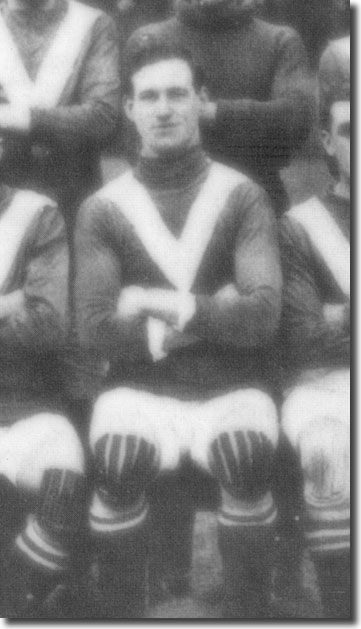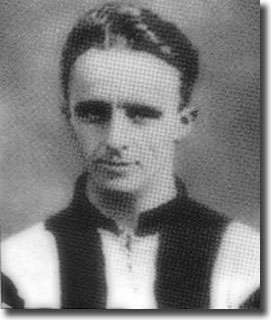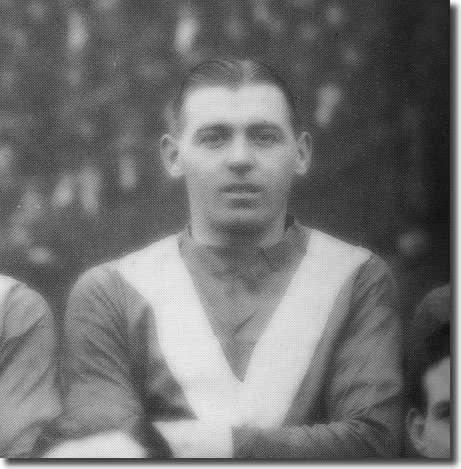 |
 |
 |
 |
 |
 |
 |
 |
 |
Unofficial League Championship Play Off Second Leg - Victoria Ground - 15,000
Scorers: None
Stoke: Peers; Maddock, Twemlow; Jones, Parker, Smith; Harrison, Whittingham, Howell, Herbert, Tempest
Leeds City: T Hampson; Millership, W Hampson; Hewison, Sherwin, Lamph; Goodwin, Cawley, Peart, Price, Hibbert
But six months earlier, the club had the opportunity to mark their ascent
to the top of the game by assuming the title of unofficial league champions. The Football League Management Committee had decided that the
1917/18 season would
be climaxed by a two-legged play off between the winners of the
Midland and Lancashire Section tournaments, with the winners to
be crowned England's champion club. When the dust had settled, the two sides who were pitched together
in that showpiece pairing were Leeds City, who had dominated the
Midland competition, and Stoke, who had come up on the rails to
pip Liverpool on goal average in the Lancashire tournament. The first leg, played at Elland Road on
4 May, had seen City secure a hard-earned 2-0 victory thanks
to goals by Billy Hibbert and Jack Peart. They had needed to show
great defensive fortitude in the face of some fierce second half
attacks by the visitors after taking what had seemed to be a unchallengeable
lead. City went with the same eleven players for the return at the
Victoria Ground on 11 May. Stoke chose to ring the changes, however,
dropping left winger Bridgett and right-back Milne, replacing
them with Billy Tempest and Jack Maddock respectively. The Potteries
team, managed by Joe Schofield, a former Stoke winger who won
three England caps between 1892 and 1895, were confident they
could overhaul the deficit, buoyed by the way they had overtaken
Liverpool to secure the Lancashire Section title. According to the Yorkshire Evening Post, 'The weather was beautifully
fine, suitable both for cricket and for football. A prompt start was made
at three o'clock, Stoke winning the toss and playing against a slight
breeze… Some local enthusiasts had expected a gate of 30,000, but that
was a very extravagant estimate and I question if the attendance reached
one third of that figure, at least when play started.' City took the early initiative with winger Ernie Goodwin making
a break down their right flank, but the assault was quickly repulsed
and Stoke countered to threaten a goal themselves. City
goalkeeper Tommy Hampson had to show great alertness to get
to the ball and clear downfield. Stoke had the opportunity to threaten more danger when they were
awarded a free kick near the City area, but they frittered away
the chance, allowing the Peacocks to go down the other end where
Goodwin drove narrowly wide of the upright. It was breathless end to end stuff in this opening spell; Hibbert
was blocked deep inside the Stoke penalty area when he tried to
create a chance and then Bob Whittingham and Billy Harrison pushed
hard at the other end, only to be thwarted by some smart work
from City full-back Harry Millership. Back came City with a fine long drive from skipper Bob Hewison,
only for right-back Maddock to deflect the ball over the bar,
with nothing coming from the resultant corner. Leeds centre-forward Jack Peart sustained an injury to his knee
which initially looked quite serious. City were gradually getting the upper hand, continuing to have
the better of the play. They were next to show with Hewison combining
well with Arthur Price to manufacture an opportunity. Stoke custodian
Teddy Peers had to leave his station to nullify the threat, but
his team were starting to creak. Harrison, though, showed good close control to work his way deep
into City territory moments afterwards and goalkeeper Hampson
needed all his splendid powers of anticipation to gather the winger's
shot at goal. Hewison fired a City free kick over the top of the Stoke goal and then
Peers was called on again to keep City at bay. The Leeds Mercury:
'Peers, the Stoke goalkeeper, was responsible in the first half for a
save but for which his team's position would have been hopeless. Price
was able to take an opening to such purpose that he dribbled by himself
right up to the goal itself, but Peers came out a yard or so and narrowed
his angle, with the result that the shot itself was extremely well parried.' The pattern of the entire game changed, though, around the half hour
mark, when Leeds suffered a grievous blow which blunted their attacking
threat. The Yorkshire Post: 'Hewison, their right half-back, and
the strongest half on the ground, on taking a kick at goal, was accidentally
jabbed by an opponent's boot, just above the ankle. The click of the blow
as Hewison fell could be heard all over the ground and it was the general
impression that the limb was broken. The damage was not as bad as that,
but the limb was so severely bruised that the player could not walk, and
after being carried off the ground could take no further part in the match.' It was later confirmed that Hewison had, in fact, fractured the
leg. He would make a brief comeback the following season, but
the injury effectively ended his playing career. In his absence,
Arthur Price dropped in to the right-half slot. The loss of their captain was a great impediment for City and
the initiative they had seized evaporated. Stoke pushed hard in
search of a goal and Whittingham pressed forward strongly but
then shot yards wide. Somehow Leeds managed to reach the break
with their aggregate advantage intact. According to the Evening Post, 'It had been anything but a good
exhibition of football in the first half, more especially after the first
quarter of an hour, but certainly the best combined movements had come
from Leeds City, whose endurance had now to After the resumption, Stoke poured all their energies into concerted
attacks on the Leeds goal. The City players were forced onto desperate
last ditch defence and were understandably relieved when the referee
decided one particular infringement was just outside the City
area. The home forwards were guilty of wasting a number of opportunities with
'far too much high and aimless kicking' according to the Evening Post
as they allowed the urgency of their plight to affect their judgement.
'Whittingham and Herbert in succession made strong bids for the Leeds
goal, neither of which came off. Stoke made a lot of play on their Whittingham-Harrison
right wing, but the pair found their movements well parried, save when
they spoiled themselves by lack of finish. The City more or less concentrated
on defence, and had plenty to do in this direction.' Leeds City could not withstand the pressure for ever and in the end it
told. After seventy-eight minutes, they conceded a penalty. The Yorkshire
Post: 'Their defence held out until a breach was caused in an unfortunate,
if avoidable, way. Whittingham was seen to fall in the Leeds penalty area,
but as he fell he was seen to knock the ball forward. The stoppage of
play suggested a free kick for Leeds for handling, but the referee, Mr
Howcroft, who kept a tight hand on the game throughout, had evidently
noticed something not apparent from the stand, for his ruling was a penalty
kick to Stoke. The kick was entrusted to Parker, who placed the ball in
the left hand corner of the net.' The goal brought the home side to within a single goal of City,
and heralded an anxious final period for Leeds. A further goal
would have taken the game to a replay the following week, scheduled
for Hyde Road, home of Manchester City, but the Peacocks' defenders
kept their heads to the end, stubbornly resisting their opponents'
advances. Indeed, City came near to scoring a goal of their own
in the closing stages, but were more than satisfied to finish
with a narrow defeat that left them winners by an aggregate score
of 2-1. The Yorkshire Post: 'The game was never a good one, in the football
sense, certainly nothing like the standard of the first match at Elland
Road, but in such as it was, Leeds could fairly claim to be the better
side, as they distinctly were in the previous engagement. The retirement
of Hewison, however, altered the aspect of affairs considerably and imposed
the necessity of defence upon the City team to a degree that would not
have been thought of under normal conditions. Their own attacks, if fewer,
were more dangerous than those of the home side.' The Leeds Mercury: 'All credit for Saturday's performance goes
to the defence, for the forwards were somewhat erratic when they had their
full complement of players, and after their numbers had been reduced they
played little further part in the game. Thus for an hour the City's defence
had an uphill fight, but they never wavered under the series of keen attacks
which the Stoke forwards levelled on their goal. So resolutely did the
City meet all these efforts that Stoke were too fatigued to derive material
benefit from their belated goal. 'W Hampson, Millership, Sherwin and Lamph stood out rarely in the resistance,
and although Price rendered useful service as an emergency half-back,
his success was somewhat marred by the fact that early in the game he
missed a glorious opportunity of scoring, and thus of giving his side
a lead of sufficient margin to save them a deal of hard work.' Following the final whistle and joyous celebration on the part
of Leeds, they were presented with the League Cup by Miss Harrison,
of Nare Hall, Staffordshire. John McKenna, Football League president,
congratulated the Leeds City directors and players on the crowning
achievement of a season's strenuous and successful football. The
unfortunate Hewison said that he and his men had travelled to
the Potteries with the firm determination of taking the cup back
with them to Yorkshire. City had played remarkably well to defy the odds after losing
their captain and had shown that they had defensive fortitude
to complement their outstanding attacking abilities. They had
enjoyed a remarkable season and their resilience in adversity
had seen them round off their campaign by claiming the unofficial
crown as England's champion club. The
first few years in the history of Leeds City Football Club had
brought mediocrity and inconsistency for the most part. But after
the appointment of Herbert
Chapman as manager in 1912,
City had gone through a convincing revival and during the First
World War had grown into one of the outstanding teams in England,
attracting some great talent to the club. They did so by pushing
hard at the boundaries of the financial regulations and their
indiscretions would lead to catastrophic consequences after the
resumption of official football following the Armistice of November
1918.
The
first few years in the history of Leeds City Football Club had
brought mediocrity and inconsistency for the most part. But after
the appointment of Herbert
Chapman as manager in 1912,
City had gone through a convincing revival and during the First
World War had grown into one of the outstanding teams in England,
attracting some great talent to the club. They did so by pushing
hard at the boundaries of the financial regulations and their
indiscretions would lead to catastrophic consequences after the
resumption of official football following the Armistice of November
1918. There
was considerable relief in the away ranks when he was fit to continue
after he resumed following treatment.
There
was considerable relief in the away ranks when he was fit to continue
after he resumed following treatment. be
tested owing to the fact that they were a man short. Still, they had kept
their first match lead of two goals, which was a good asset.'
be
tested owing to the fact that they were a man short. Still, they had kept
their first match lead of two goals, which was a good asset.'